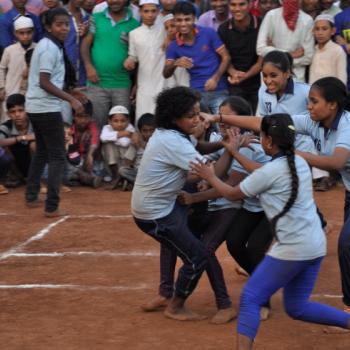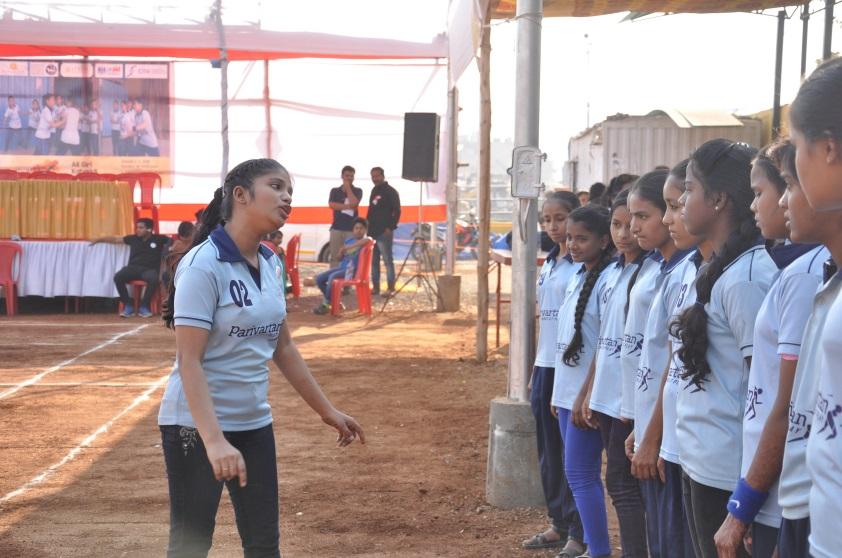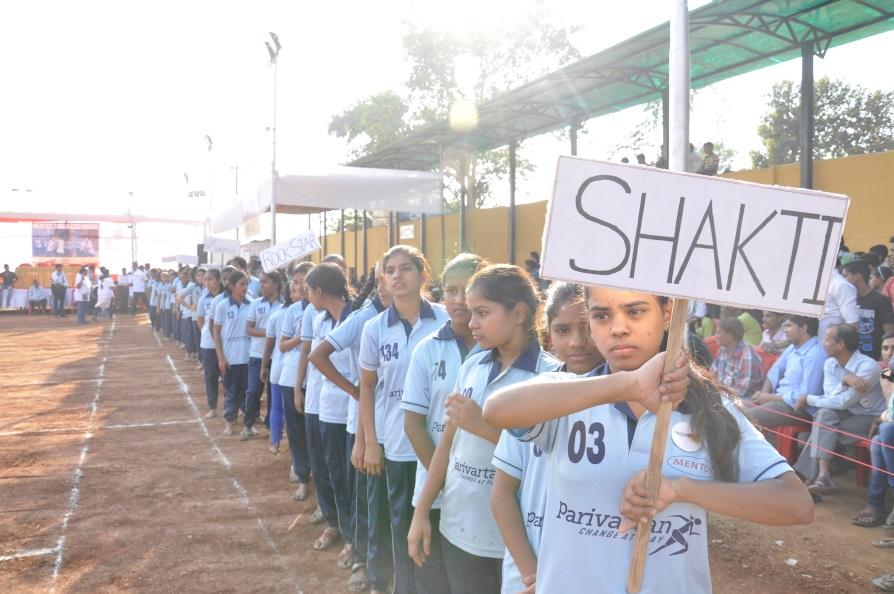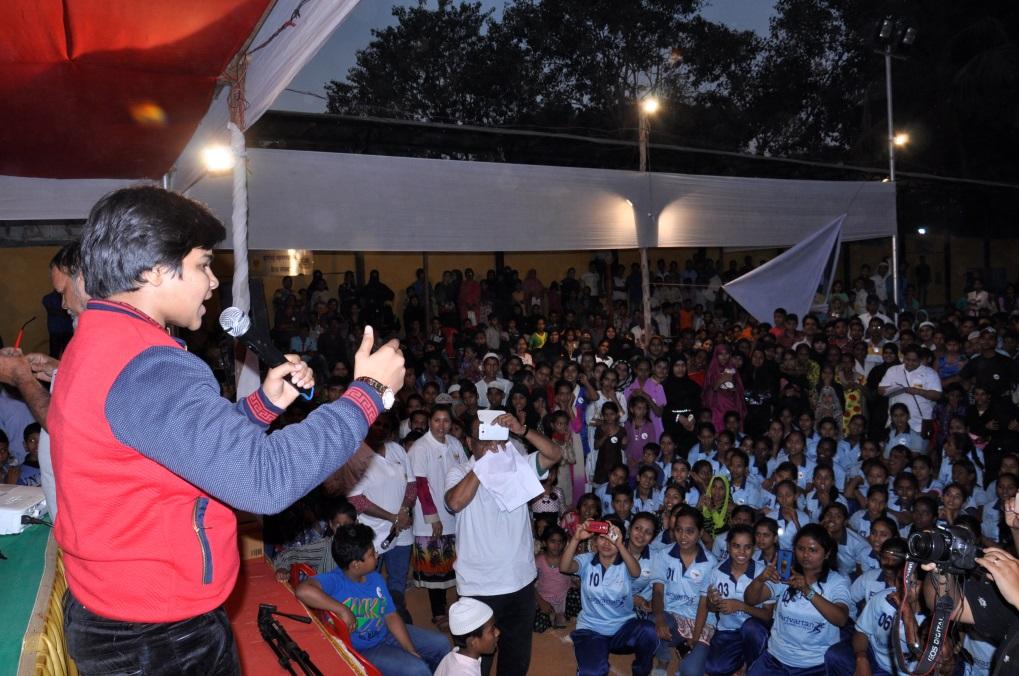
Adolescent girls of Shivaji Nagar (Mumbai) are defying gender norms and claiming public spaces by playing the popular Indian sport of Kabaddi.

“I have finally made up my mind to pursue a Master’s Programme in Social Work after completing my graduation!” says an elated Subiya. She is 20 years-old and has been instrumental in motivating young mentees to successfully compete in an all-girl Kabaddi tournament in Mumbai, India. A year ago, Subiya could not have imagined that the usually shy, and rarely seen outside, girls from her slum community would defy gender discrimination by playing Kabaddi, considered a “masculine” sport, and by occupying the vast public grounds of Shivaji Nagar, which have never been considered as an appropriate place for girls.
The Kabaddi tournament, held earlier this year, was the culmination of an 18-month long sports and mentorship programme called Parivartan. The program was implemented by the International Center for Research on Women (ICRW), along with a community-based partner in Mumbai, and led by the London School of Hygiene and Tropical Medicine.
“When I first heard about the programme, I got really excited, however, on finding out that we will be playing Kabaddi, I felt extremely nervous as most of the girls in our community are school drop-outs and do not step out of their homes, due to the fear of harassment,” said Subiya.
Life in a typical Mumbai slum community is characterised by dense and overcrowded streets that are seen as “natural” spaces for boys and men, with few women and girls present. Most girls who live in these communities live in an atmosphere of fear, where dreams and aspirations are inevitably suppressed. Because of these limitations and other deeply-held gender norms that lead to discrimination, one in every two girls is married before the age of 18.
Parivartan launched with the aim of empowering adolescent girls (ages 12-16) by pairing them up with mentors (ages 18-24) and coaching them on team work, communication and negotiation skills and empowerment through sport. The two-hour long Kabaddi sessions on Sundays provided girls a much-needed respite from their household chores, improved their physical fitness and also gave them a safe space to discuss topics ranging from life skills, health, gender, violence and sexual harassment.
One of the key objectives of the programme was to better understand the most effective ways of creating alternative norms that allow girls and young women to claim spaces that are usually not considered appropriate for them.
“The biggest change that is noticeable in our girls is the way they now perceive themselves. They are not only more comfortable with their own bodies, but there has also been a remarkable improvement in their articulation skills which in turn helps them negotiate better in their personal lives,” notes Madhumita Das, Parivartan project leader.
“The journey for most of the girls who started with us a year ago hasn’t been easy,” says Hasina Sheikh who has been working closely with ICRW to implement the programme. “Bringing girls out to play was an extremely challenging task as some of these girls had never stepped out of their homes without the niqaab (veil). Many of our girls also succumbed to the societal pressure and eventually dropped out. We had to persistently try to bring them back by counselling their parents.”

The Kabaddi tournament drew a massive crowd of more than 500 people, including athletes, parents, men and boys from the community. Watching the girls play has instilled a sense of hope among parents, and has raised girls’ aspirations to achieve more.
“Initially my husband didn’t allow me to send the girls to play. I persuaded him to let our girls’ progress further, in order to know their true potential,” says Shehnaz Begum, mother of one of the young athletes. “Our girls stepped forward, competed and won the match today! They achieved what they aspired for.”
“Promoting gender equality doesn’t happen overnight. It requires a great deal of hard work innovation, and perseverance,” says Ravi Verma, Regional Director, ICRW Asia Region. “Sports for girls can be fun, but implementing such programmes can be challenging, as we raise the hard question about sustaining the process of change. Parivartan is unique because it is driven by this understanding, ensuring the mentors, athletes, parents and communities respond to these challenges with pride and conviction.”
(The success of the program is reflected in the news that Parivartan girls are now participating in a community-led anti-violence group.)

Girls who won the Kabaddi tournament were celebrated by renowned female wrestler- Divya Kakran, a 17 year-old gold medallist of the Asian Cadet Wrestling Championship. Kakran delivered a powerful speech on how parents need to have more faith and confidence in their daughters so that they are able to realise their true potential: “Young girls like us do not need just resources to fulfil our aspirations. Half the battle is won if we receive motivation, support and encouragement from our parents and other family members. If parents show conviction in their daughters, society will change for better.”
You can read more about the Kabbadi project in this Times of India story
Join us at the #YLgenderyouth conference
Madhumita Das, Shweta Bankar, Martine Collumbien and Ravi Verma will be presenting the paper: Ensuring Gender Equality through a Sport-based Program: Identifying Alternative Norms to Increase Women’s Mobility at the Young Lives' Adolescence, Youth and Gender conference on 8 September 2016. The paper will soon be available to download.

Adolescent girls of Shivaji Nagar (Mumbai) are defying gender norms and claiming public spaces by playing the popular Indian sport of Kabaddi.

“I have finally made up my mind to pursue a Master’s Programme in Social Work after completing my graduation!” says an elated Subiya. She is 20 years-old and has been instrumental in motivating young mentees to successfully compete in an all-girl Kabaddi tournament in Mumbai, India. A year ago, Subiya could not have imagined that the usually shy, and rarely seen outside, girls from her slum community would defy gender discrimination by playing Kabaddi, considered a “masculine” sport, and by occupying the vast public grounds of Shivaji Nagar, which have never been considered as an appropriate place for girls.
The Kabaddi tournament, held earlier this year, was the culmination of an 18-month long sports and mentorship programme called Parivartan. The program was implemented by the International Center for Research on Women (ICRW), along with a community-based partner in Mumbai, and led by the London School of Hygiene and Tropical Medicine.
“When I first heard about the programme, I got really excited, however, on finding out that we will be playing Kabaddi, I felt extremely nervous as most of the girls in our community are school drop-outs and do not step out of their homes, due to the fear of harassment,” said Subiya.
Life in a typical Mumbai slum community is characterised by dense and overcrowded streets that are seen as “natural” spaces for boys and men, with few women and girls present. Most girls who live in these communities live in an atmosphere of fear, where dreams and aspirations are inevitably suppressed. Because of these limitations and other deeply-held gender norms that lead to discrimination, one in every two girls is married before the age of 18.
Parivartan launched with the aim of empowering adolescent girls (ages 12-16) by pairing them up with mentors (ages 18-24) and coaching them on team work, communication and negotiation skills and empowerment through sport. The two-hour long Kabaddi sessions on Sundays provided girls a much-needed respite from their household chores, improved their physical fitness and also gave them a safe space to discuss topics ranging from life skills, health, gender, violence and sexual harassment.
One of the key objectives of the programme was to better understand the most effective ways of creating alternative norms that allow girls and young women to claim spaces that are usually not considered appropriate for them.
“The biggest change that is noticeable in our girls is the way they now perceive themselves. They are not only more comfortable with their own bodies, but there has also been a remarkable improvement in their articulation skills which in turn helps them negotiate better in their personal lives,” notes Madhumita Das, Parivartan project leader.
“The journey for most of the girls who started with us a year ago hasn’t been easy,” says Hasina Sheikh who has been working closely with ICRW to implement the programme. “Bringing girls out to play was an extremely challenging task as some of these girls had never stepped out of their homes without the niqaab (veil). Many of our girls also succumbed to the societal pressure and eventually dropped out. We had to persistently try to bring them back by counselling their parents.”

The Kabaddi tournament drew a massive crowd of more than 500 people, including athletes, parents, men and boys from the community. Watching the girls play has instilled a sense of hope among parents, and has raised girls’ aspirations to achieve more.
“Initially my husband didn’t allow me to send the girls to play. I persuaded him to let our girls’ progress further, in order to know their true potential,” says Shehnaz Begum, mother of one of the young athletes. “Our girls stepped forward, competed and won the match today! They achieved what they aspired for.”
“Promoting gender equality doesn’t happen overnight. It requires a great deal of hard work innovation, and perseverance,” says Ravi Verma, Regional Director, ICRW Asia Region. “Sports for girls can be fun, but implementing such programmes can be challenging, as we raise the hard question about sustaining the process of change. Parivartan is unique because it is driven by this understanding, ensuring the mentors, athletes, parents and communities respond to these challenges with pride and conviction.”
(The success of the program is reflected in the news that Parivartan girls are now participating in a community-led anti-violence group.)

Girls who won the Kabaddi tournament were celebrated by renowned female wrestler- Divya Kakran, a 17 year-old gold medallist of the Asian Cadet Wrestling Championship. Kakran delivered a powerful speech on how parents need to have more faith and confidence in their daughters so that they are able to realise their true potential: “Young girls like us do not need just resources to fulfil our aspirations. Half the battle is won if we receive motivation, support and encouragement from our parents and other family members. If parents show conviction in their daughters, society will change for better.”
You can read more about the Kabbadi project in this Times of India story
Join us at the #YLgenderyouth conference
Madhumita Das, Shweta Bankar, Martine Collumbien and Ravi Verma will be presenting the paper: Ensuring Gender Equality through a Sport-based Program: Identifying Alternative Norms to Increase Women’s Mobility at the Young Lives' Adolescence, Youth and Gender conference on 8 September 2016. The paper will soon be available to download.

